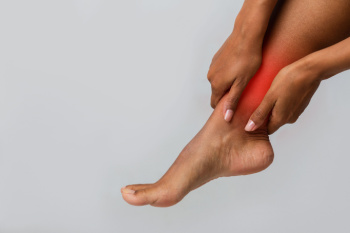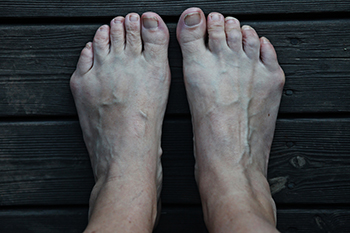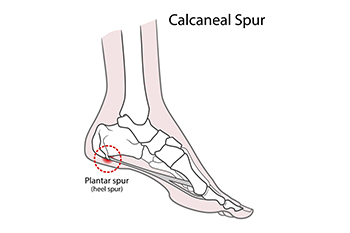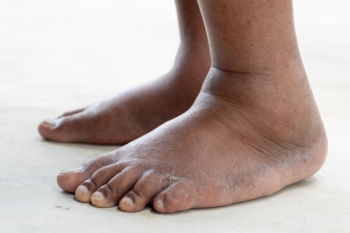Connect With Us
Blog
Items filtered by date: July 2025
Understanding Congenital Foot Conditions and Podiatric Care

Congenital foot conditions are structural abnormalities present at birth that can affect a child's mobility and development. Clubfoot involves the foot turning inward and downward. Planovalgus refers to a flat foot with the heel rolled outward. Cavus foot is marked by a high arch that can lead to instability. Congenital vertical talus presents with a rigid flatfoot and upward-facing sole, while metatarsus adductus is a curve in the front half of the foot. These conditions may vary in severity but often benefit from early diagnosis and treatment. A podiatrist can offer bracing, custom orthotics, or surgical guidance when needed. If your child shows signs of a foot abnormality, it is suggested that you include a podiatrist on your health care team to ensure your child receives correct treatment.
Congenital foot problems require immediate attention to avoid future complications. If you have any concerns, contact Zina Cappiello, DPM of Dr. Zina B. Cappiello DPM, LLC. Our podiatrist can provide the care you need to keep you pain-free and on your feet.
Congenital foot problems are deformities affecting the feet, toes, and/or ankles that children are born with. Some of these conditions have a genetic cause while others just happen. Some specific foot ailments that children may be born with include clubfeet, polydactyly/macrodactyly, and cleft foot. There are several other foot anomalies that can occur congenitally. What all of these conditions have in common is that a child may experience difficulty walking or performing everyday activities, as well as trouble finding footwear that fits their foot deformity. Some of these conditions are more serious than others. Consulting with a podiatrist as early as possible will help in properly diagnosing a child’s foot condition while getting the necessary treatment underway.
What are Causes of Congenital Foot Problem?
A congenital foot problem is one that happens to a child at birth. These conditions can be caused by a genetic predisposition, developmental or positional abnormalities during gestation, or with no known cause.
What are Symptoms of Congenital Foot Problems?
Symptoms vary by the congenital condition. Symptoms may consist of the following:
- Clubfoot, where tendons are shortened, bones are shaped differently, and the Achilles tendon is tight, causing the foot to point in and down. It is also possible for the soles of the feet to face each other.
- Polydactyly, which usually consists of a nubbin or small lump of tissue without a bone, a toe that is partially formed but has no joints, or an extra toe.
- Vertical talus, where the talus bone forms in the wrong position causing other bones in the foot to line up improperly, the front of the foot to point up, and the bottom of the foot to stiffen, with no arch, and to curve out.
- Tarsal coalition, when there is an abnormal connection of two or more bones in the foot leading to severe, rigid flatfoot.
- Cleft foot, where there are missing toes, a V-shaped cleft, and other anatomical differences.
- Macrodactyly, when the toes are abnormally large due to overgrowth of the underlying bone or soft tissue.
Treatment and Prevention
While there is nothing one can do to prevent congenital foot problems, raising awareness and receiving neonatal screenings are important. Early detection by taking your child to a podiatrist leads to the best outcome possible.
If you have any questions please feel free to contact our office located in Clifton, NJ . We offer the newest diagnostic tools and technology to treat your foot and ankle needs.
When Your Ankles Will Not Let You Move With Ease

Ankle pain can interrupt daily life, whether it stems from an old injury, overuse, arthritis, or a sudden twist. It may appear as swelling, stiffness, or sharp discomfort when walking or standing. Without the right care, even mild symptoms can worsen over time and limit mobility. Rest, elevation, and wearing supportive footwear may help in the short term, but lasting relief depends on identifying the cause. A podiatrist can assess whether the pain is due to joint damage, ligament strain, or another issue entirely. Treatment might include custom orthotics or bracing to support healing. Because ankles play such a key role in balance and movement, ongoing pain should not be ignored. If your ankle remains sore or unstable, it is suggested that you see a podiatrist to find the right treatment and keep your steps steady and pain-free.
Ankle pain can be caused by a number of problems and may be potentially serious. If you have ankle pain, consult with Zina Cappiello, DPM from Dr. Zina B. Cappiello DPM, LLC. Our podiatrist will assess your condition and provide you with quality foot and ankle treatment.
Ankle pain is any condition that causes pain in the ankle. Due to the fact that the ankle consists of tendons, muscles, bones, and ligaments, ankle pain can come from a number of different conditions.
Causes
The most common causes of ankle pain include:
- Types of arthritis (rheumatoid, osteoarthritis, and gout)
- Ankle sprains
- Broken ankles
- Achilles tendonitis
- Achilles tendon rupture
- Stress fractures
- Bursitis
- Tarsal tunnel syndrome
- Plantar fasciitis
Symptoms
Symptoms of ankle injury vary based upon the condition. Pain may include general pain and discomfort, swelling, aching, redness, bruising, burning or stabbing sensations, and/or loss of sensation.
Diagnosis
Due to the wide variety of potential causes of ankle pain, podiatrists will utilize a number of different methods to properly diagnose ankle pain. This can include asking for personal and family medical histories and of any recent injuries. Further diagnosis may include sensation tests, a physical examination, and potentially x-rays or other imaging tests.
Treatment
Just as the range of causes varies widely, so do treatments. Some more common treatments are rest, ice packs, keeping pressure off the foot, orthotics and braces, medication for inflammation and pain, and surgery.
If you have any questions, please feel free to contact our office located in Clifton, NJ . We offer the newest diagnostic and treatment technologies for all your foot care needs.
What to Know About Bunionette Deformity

A bunionette, sometimes called a tailor’s bunion, is a bony bump that forms along the outside of the foot at the base of the little toe. It occurs when the fifth metatarsal bone shifts outward while the toe is angled inward, causing pressure and discomfort. This deformity is often linked to genetics, foot structure, or shoes that are too tight across the toes. Symptoms may include redness, swelling, and pain that worsens with activity or certain footwear. Over time, the area may become increasingly irritated, especially if the bump rubs against the inside of the shoe. Early treatment may involve changing to wider shoes, using padding, or trying orthotics to reduce pressure. If pain persists despite these efforts, surgical options may be considered to realign the bone. If you are experiencing discomfort near your smallest toe, it is suggested that you see a podiatrist to determine the best course of care.
If you are suffering from bunions, contact Zina Cappiello, DPM of Dr. Zina B. Cappiello DPM, LLC. Our podiatrist can provide the care you need to keep you pain-free and on your feet.
What Is a Bunion?
A bunion is formed of swollen tissue or an enlargement of boney growth, usually located at the base joint of the toe that connects to the foot. The swelling occurs due to the bones in the big toe shifting inward, which impacts the other toes of the foot. This causes the area around the base of the big toe to become inflamed and painful.
Why Do Bunions Form?
Genetics – Susceptibility to bunions are often hereditary
Stress on the feet – Poorly fitted and uncomfortable footwear that places stress on feet, such as heels, can worsen existing bunions
How Are Bunions Diagnosed?
Doctors often perform two tests – blood tests and x-rays – when trying to diagnose bunions, especially in the early stages of development. Blood tests help determine if the foot pain is being caused by something else, such as arthritis, while x-rays provide a clear picture of your bone structure to your doctor.
How Are Bunions Treated?
- Refrain from wearing heels or similar shoes that cause discomfort
- Select wider shoes that can provide more comfort and reduce pain
- Anti-inflammatory and pain management drugs
- Orthotics or foot inserts
- Surgery
If you have any questions, please feel free to contact our office located in Clifton, NJ . We offer the newest diagnostic and treatment technologies for all your foot care needs.
Do I Have a Heel Spur?

Heel spurs are bony growths that develop on the underside of the heel bone, often caused by long-term strain on foot muscles and ligaments. They are frequently associated with plantar fasciitis and may result from repeated stress, walking abnormalities, or footwear that lacks adequate support. Risk factors include obesity, flat feet, aging, and extended periods of standing or walking. Symptoms include sharp heel pain, especially with the first steps in the morning. A podiatrist can diagnose heel spurs using imaging and physical examination and may recommend treatments, such as custom orthotics, stretching exercises, or footwear changes. If heel pain is affecting your mobility, it is suggested that you consult a podiatrist to find relief and regain comfort in your daily activities.
Heel spurs can be incredibly painful and sometimes may make you unable to participate in physical activities. To get medical care for your heel spurs, contact Zina Cappiello, DPM from Dr. Zina B. Cappiello DPM, LLC. Our podiatrist will do everything possible to treat your condition.
Heels Spurs
Heel spurs are formed by calcium deposits on the back of the foot where the heel is. This can also be caused by small fragments of bone breaking off one section of the foot, attaching onto the back of the foot. Heel spurs can also be bone growth on the back of the foot and may grow in the direction of the arch of the foot.
Older individuals usually suffer from heel spurs and pain sometimes intensifies with age. One of the main condition's spurs are related to is plantar fasciitis.
Pain
The pain associated with spurs is often because of weight placed on the feet. When someone is walking, their entire weight is concentrated on the feet. Bone spurs then have the tendency to affect other bones and tissues around the foot. As the pain continues, the feet will become tender and sensitive over time.
Treatments
There are many ways to treat heel spurs. If one is suffering from heel spurs in conjunction with pain, there are several methods for healing. Medication, surgery, and herbal care are some options.
If you have any questions feel free to contact our office located in Clifton, NJ . We offer the latest in diagnostic and treatment technology to meet your needs.
Ankle Fracture? Don’t Wait for Treatment
Edema in the Foot and Ankle

Edema is swelling caused by excess fluid buildup, commonly affecting the feet and ankles. It can result from aging, blood clots, obesity, or infections. As people age, circulation slows, making fluid retention more likely. Blood clots can block veins, causing sudden swelling, while infections trigger inflammation and fluid accumulation. Symptoms include noticeable swelling, tight or shiny skin, and a feeling of heaviness or discomfort. Pressing on the swollen area may leave a temporary indentation, called pitting edema. Infections may also cause redness, warmth, and pain. A podiatrist can diagnose edema by examining the foot and ankle, reviewing your medical history, and ordering tests such as ultrasounds to check circulation. Treatment focuses on addressing the underlying cause, reducing swelling with compression, elevation, medications, or wound care, if infection is present. If you have swollen feet or ankles, it is suggested that you schedule an appointment with a podiatrist for an evaluation and appropriate treatment.
Swollen feet can be a sign of an underlying condition. If you have any concerns, contact Zina Cappiello, DPM of Dr. Zina B. Cappiello DPM, LLC. Our podiatrist can provide the care you need to keep you pain-free and on your feet.
Swollen feet are a common ailment among pregnant women and people who stand or sit for extended periods. Aging may increase the possibility of swollen feet and patients who are obese often notice when their feet are swelling too. There may be medical reasons why swollen feet occur:
- Phlebitis - A condition that causes the veins to become inflamed and can also cause leg pain.
- Liver disease - This may lead to low blood levels of albumin which is a protein. This can cause fluid in the blood to pass into the tissues and several areas of the body can become swollen.
- Heart failure - When the heart doesn’t pump properly the blood that is normally pumped back to the heart can pool in the veins of the legs causing swollen feet.
- Kidney disease - One of the main functions of the kidneys is releasing excess fluid in the body. This type of condition can make it difficult for the kidneys to function properly, and as a result the feet may become swollen.
- Deep-vein thrombosis (DVT)- This is a serious condition where blood clots form in the veins of the legs. They can block the return of blood from the legs to the heart which may cause the feet to swell. It is important to be treated by a podiatrist if this condition is present.
Swollen feet can also be caused by bone and tendon conditions, including fractures, arthritis, and tendinitis. Additionally, there may be skin and toenail conditions and an infection may cause the feet to swell. Patients who take medicine to treat high blood pressure may be prone to getting swollen feet.
Many patients elevate their feet to help relieve the swelling and this is generally a temporary remedy. When a podiatrist is consulted the reason behind the swelling can be uncovered and subsequently treated.
If you have any questions please feel free to contact our office located in Clifton, NJ . We offer the newest diagnostic tools and technology to treat your foot and ankle needs.

